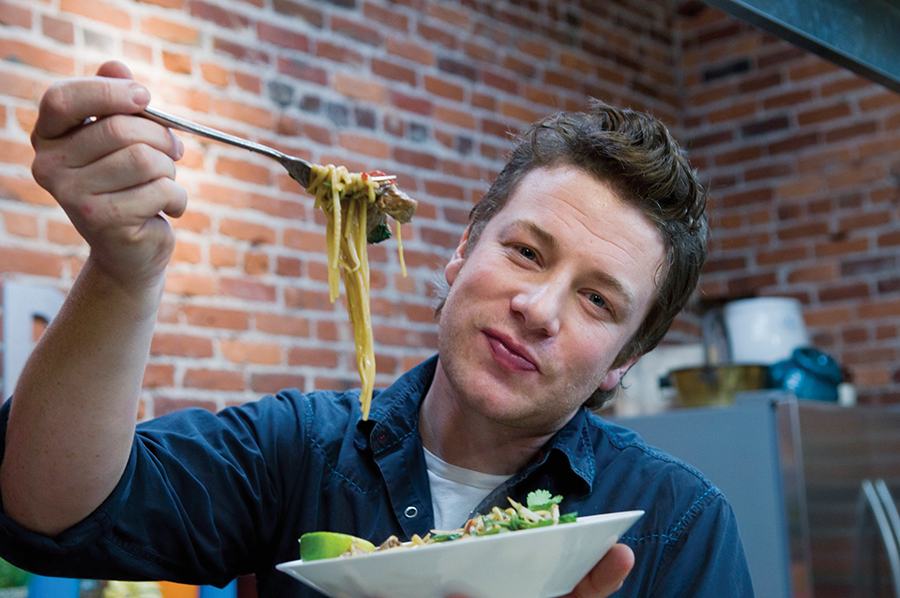Chef Jamie Oliver is hoping his new show on ABC will help change the way people eat in Huntington and across America.
By Carter Seaton
HQ 69 | WINTER/SPRING 2010
British-born celebrity chef Jamie Oliver is a radical, a revolutionary, an activist. And like others of his kind, he often stirs up controversy. His cause? Tackling worldwide obesity and its attendant health problems by trying to change the way folks eat and think about food. In August 2008, after the Center for Disease Control dubbed Huntington the unhealthiest city in the country, some folks saw red. So, when Oliver headed our way last fall to film his new television series Jamie Oliver’s Food Revolution, which will debut on ABC March 26, many were worried about how we’d be portrayed in the national spotlight. But the fact is that Oliver chose Huntington because he wanted to show the rest of the country that there is more to Huntington than our unfortunate badge.
“There are towns and cities all over the United States and the world with the same problems as Huntington,” he said. “I wanted to go somewhere that anyone could recognize as ‘home’ – with great people, a great community and a real desire to make things happen.”
Before he hit town, the affable 34-year-old father of three young girls was best known as the star of BBC’s The Naked Chef, also seen here on the Food Network, the author of nine best-selling cookbooks and, albeit less so, the coordinator for programs that introduced fresh, nutritious food to school lunch programs in the U.K. five years ago.
Less publicized was his philanthropic activity, which centers on both food and youth. Oliver’s “Fifteen Foundation” uses the profits from his chain of restaurants in England to train young people to become chefs.
“I started the Fifteen Foundation in 2002,” said Oliver, “because I’d made a bit of money and wanted to give something back to the catering industry. I was worried about the number of young people who left school without qualifications and didn’t seem to have a mentor or anyone to inspire them to get a career.”
Now, thanks to the work of the Fifteen Foundation, 12 to 18 young people – many whose backgrounds include crime, drugs or homelessness – graduate each year and begin work in the catering industry.
Perhaps his background influenced this charitable bent. Oliver grew up hyperactive and dyslexic; he had trouble with reading and writing and was placed in the lowest academic classes. He failed every subject but art and geology. Oliver left school at 16 and, except for what he learned working in his father’s pub since the age of eight, had few skills to predict his future success. But at his father’s pub, he had learned to clean floors, chop vegetables – anything to earn pocket money – and, by 13, was cooking full meals alongside the pub’s chef. Since Oliver grew up loving those freshly cooked meals, he knew early on that he wanted to be a chef.
After graduating from Westminster Catering College, Oliver cooked for a while in France, learning all he could, and then returned to London. While substituting for a fellow worker at London’s trendy River Café, the oft-described “cheeky” young man was spotted by the editors of a television crew filming a documentary at the restaurant.
“They spent a long time filming me, and when the program ended up on television I was all over it,” he said. “The next day, I had five production companies phoning up the restaurant wanting to talk to me about my own series. I thought they were joking.”
Oliver said he considers himself quite lucky to have grown up in the food business and to have been in the right place at the right time.

In September 2009, Oliver arrived in Huntington with Ryan Seacrest, who produced Oliver’s new series and pitched it to ABC. Almost overnight, the former Le Cook Store on Third Avenue was renamed Jamie’s Kitchen. Folks began enrolling in cooking lessons from the “Naked Chef,” – a moniker Oliver adopted to promote the use of unprocessed or minimally processed, fresh foods. For the next six weeks, the television cameras were rolling. Huntington’s Stacy McChesney, Oliver’s kitchen manager, said the experience was eye-opening. She was surprised to meet people who had never cooked in their own homes.
“He simply wanted to get people cooking at home and see if they could ultimately transform their lives,” she said. “If he did that with one person, then he achieved his goal.”
And judging from the numbers – more than 1,000 people attended his classes – he achieved his goal more than once.
According to McChesney, a wide variety of people participated. Classes included moms with several children, single dads, retired couples and working folks with little time to cook. Their skill levels were all over the map as well, McChesney said.
Jonathan Sutton, an accountant with the Alumni Relations office at Marshall University, was familiar with Oliver and made it a point to take his classes. He said he does cook at home but only considers himself a “part-time cook.” When he learned how much better dishes taste when they are prepared with fresh foods, he changed the way he shops and cooks.
“Now, I look at the fresh vegetables,” Sutton said. “I don’t go down the canned foods aisle.”
While he was here, Oliver did more than conduct classes and create a television show. He helped raise money for the Good Samaritan Food Ministry in Kenova and began implementing a school food revolution similar to the one he started in the UK. Although challenging, he said it was one of the most rewarding experiences of his time in West Virginia.

Working with school officials, Oliver introduced new menus in several Cabell County schools, and thanks to an $80,000 grant from Cabell Huntington Hospital, the program will be expanded to all 28 schools in the county. That means more than 12,500 students will taste the changes. All Cabell County school cooks will learn to prepare healthier meals for their students, changing their menus to remove processed food and improve their use of locally grown and nutritious ingredients. That pleases Oliver.
“I want Huntington to be a shining example,” he said. “I really dream that in the next two to three years, every school will be changed.”
And what’s become of Jamie’s Kitchen now that the show is in the can? Now called Huntington’s Kitchen, it is operating under the direction of Ebenezer Medical Outreach (EMO). Yvonne Jones, executive director of EMO, said she believes it’s what her organization was meant to tackle.
“Our mission is to provide health care, preventative care and pharmaceuticals to the uninsured of the Tri-State region,” she said. “Good nutrition is the best preventative care anyone can take.”
Although it may have sounded illogical for such a young agency to take on this project, Jones believed the finances would come. And they did. Cabell Huntington Hospital stepped to the plate once more, donating $50,000 to continue the cooking classes started by Oliver.
“We are very pleased to join with Ebenezer Medical Outreach, Jamie Oliver and the entire Huntington area to work together to prevent many of the problems associated with unhealthy eating,” said Brent A. Marsteller, president and CEO of Cabell Huntington Hospital.
Jamie Oliver has come and gone, but his words still echo within the hearts – and kitchens – of those he met while he was here.
“It’s hard for me to understand people who don’t want to eat well,” Oliver said. “We have to eat every day just to live. To me, that should be a pleasure. I believe that every child in America has the right to fresh, nutritious school meals, and every family deserves real, honest, wholesome food. Too many people are being affected by what they eat. America needs to stand up for better food. I truly believe Huntingtonians can be the start of a national movement to improve food in the USA.”
On Feb. 10, 2010, Oliver was named the 2010 winner of the TED prize awarded by the TED Foundation, a nonprofit organization dedicated to recognizing “ideas worth spreading.” Oliver will be given $100,000 to help make his “one big wish” to change the world come true. Oliver’s wish? “To create a strong, sustainable movement to educate every child about food, inspire families to cook again and empower people everywhere to fight obesity.”
In other words, the revolution that began right here in Huntington will now be spread across the nation. The TED Foundation will fund the creation of a network of community kitchens, a traveling food theater that will teach kids practical cooking skills in an entertaining way, and an online community to bring millions of people together in the fight against obesity.
Now that is definitely an idea worth spreading.





